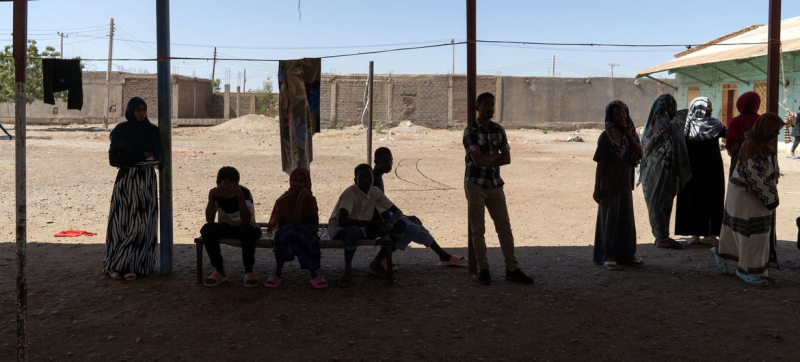- 94 Palestinians killed in Gaza, 45 people at aid sites |
- Opening of UN rights office at talk stage: Foreign Adviser |
- AC Tabassum Urmi sacked over anti- govt Facebook posts |
- Bangladeshi killed in BSF firing at Chuadanga border |
- Rains Fuel Disasters in 83pc of Brazilian Cities: Report |
UN Warns of Displacement and Flood Risk in War-Torn Sudan

People displaced by the conflict in Sudan rest at a facility in eastern Sudan after fleeing Khartoum.
UN humanitarians on Tuesday sounded the alarm over worsening humanitarian conditions in Sudan, as escalating violence continues to displace civilians and increase the risk of severe flooding during the current rainy season.
At Tuesday’s regular briefing at UN Headquarters in New York, spokesperson Stéphane Dujarric relayed warnings from the UN Office for the Coordination of Humanitarian Affairs (OCHA), citing urgent concerns across the country.
“Across Sudan, we continue to be deeply concerned about the humanitarian impact of the ongoing fighting, which is escalating displacement and driving needs even higher,” Mr. Dujarric said.
Clashes between rival militaries – the Sudanese Armed Forces (SAF) and the Rapid Support Forces (RSF) – continue to uproot civilians, particularly in the Darfur and Kordofan states. Fighting in El Fasher alone has displaced more than 400,000 people since April, according to OCHA.
In June, nearly 8,000 displaced people from North Darfur arrived in Ad-Dabba, putting pressure on overstretched resources and limiting access to healthcare, shelter, clean water, and food.
In North Kordofan, more than 16,000 people were forced to flee their homes in Bara between 26 and 29 June alone, while another 16,000 were forced to flee Babanusa in West Kordofan on 27 June, according to the UN International Organization for Migration (IOM).
Separately, OCHA warned of increased flood risks as Sudan enters its rainy season, which runs through October. Forecasts point to above-average rainfall, heightening the threat of both riverine and flash floods—especially in areas with limited infrastructure and access.
“Any flooding could disrupt road access, hamper aid delivery, and heighten the threat of disease outbreaks during the ongoing lean season,” Mr. Dujarric said, noting that a continuing cholera outbreak could worsen with the floods.
Nearly 500,000 people were affected by floods last year. With the likelihood of a repeat—or worse—this season, Mr. Dujarric said humanitarian agencies are ready to respond “where access and resources allow,” but warned that critical funding gaps are hampering preparedness.
Mr. Dujarric also highlighted the importance of recent discussions between Under-Secretary-General for Humanitarian Affairs Tom Fletcher and senior SAF and RSF officials.
Mr. Fletcher appealed for a humanitarian pause to allow lifesaving aid to reach people in El Fasher, which has been besieged by the RSF and cut off from assistance since last April.
“Our humanitarian colleagues underscore that we will continue our engagements with the aim of facilitating the swift and safe delivery of aid to all those who need it,” Mr. Dujarric said.

